Serendip is an independent site partnering with faculty at multiple colleges and universities around the world. Happy exploring!
Emergent Pedagogy and the Brain: Three Loops
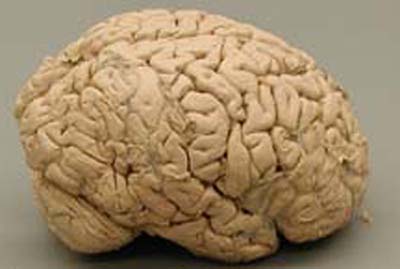 |
The Brain and Open-Ended Transactional Inquiry: 21 July 2009 |
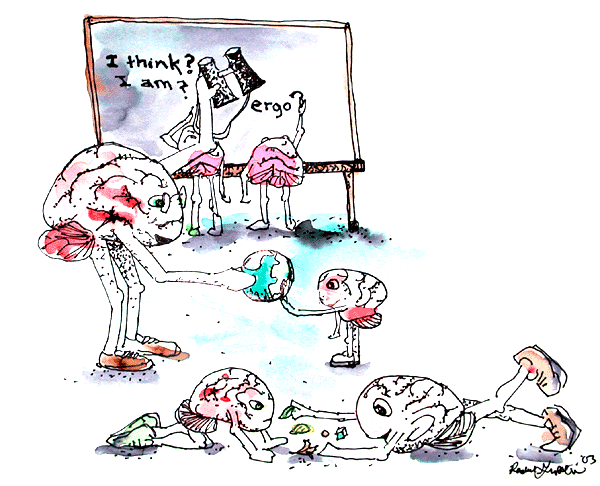 |
|
What is understanding? How it is achieved? How does that relate to the classroom? "So what does resistance tell us?" Understanding as absence of conflict and learning as conflict resolution:
New conflicts? Your thoughts in the forum below ... |
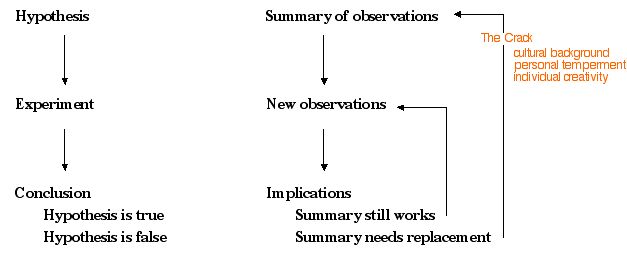
|

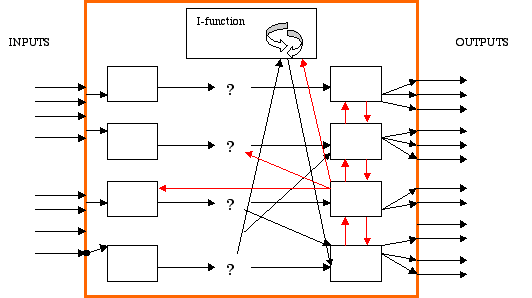
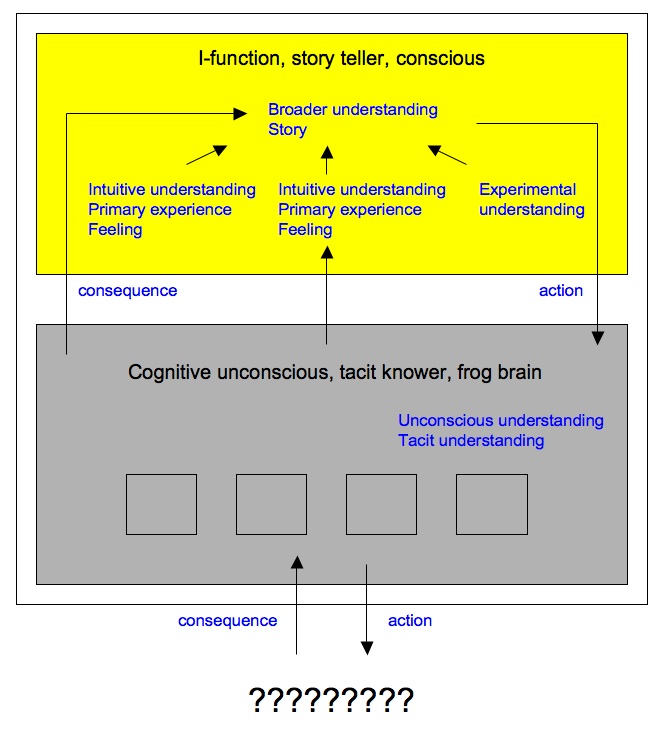
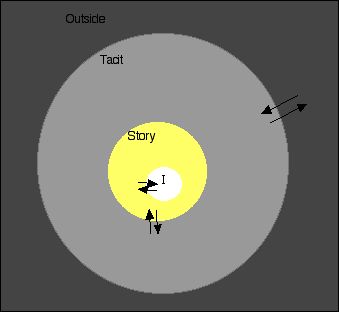
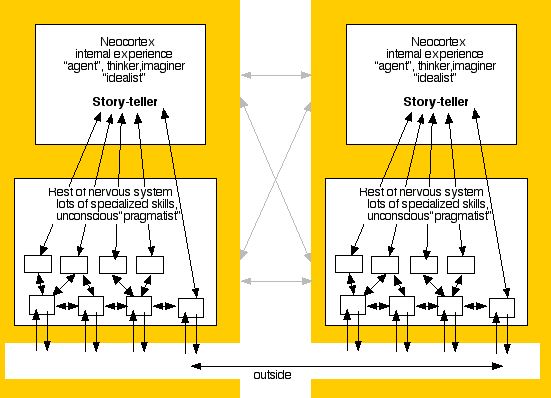


Comments
Three Loops
I received much info from Paul today. So conflict can be a good thing if you don't ignore it but try to develop a new understanding from it. I'll remember this the next time the choir has dissonance about interpretation of the music we're singing, what to wear,etc. The Sudoku puzzle I thoroughly enjoyed and I thought of it as down time for me. I'm not afraid of failure so I'll open all the boxes until I become as successful at it as I am with crosswords and cryptograms. The time limit was frustrating but understandable. Thanks for a new educational tool.
the unconscious in the classroom ... and life
A theme worth exploring further?
this separation of unconscious and conscious greatly intrigues me. The separation is often more one-sided though: the conscious gets the majority of the 'action' in social relations. Should the unconscious have its time to come forward? ... Brie
you are so correct about consciousness interrupting and getting in the way of meditating. It is tough to live-in-the-moment because (mostly conscious) thoughts keep clouding us from being 100% involved in one thing that we are doing now. A quiet mind for a period of time during the day is very restful. Most of us do not know how to truly relax ... Edward
many times we tell our students their thinking too hard or making something more difficult then it has to be...when they relax and just "do" they seem to get it ... Dalia
I've read "The Inner Game of Golf" which trains one to get their conscious brain out of the way and activate the subconscious talent one has in golf. When I do it well, it works. It is hard to do because you need to shut down the ego. I've applied the technique to other physical pursuits, but until Tue morning had not thought to use it in a purely intellectual vein. Time to reread the book and consider how to take advantage of the power of the subconscious ... Stephen
Some additional perhaps relevant books ...
Zen and the Art of Motorcycle Maintenance ... Robert Persig, 1974
The Tao is Silent ... Raymond Smullyan, 1977
Beyond Boredom and Anxiety: Experiencing Flow in Work and Play ... Mihály Csíkszentmihály, 1975 (also Flow, The Psychology of Optimal Experience, 1990)
the inner game
The fellow who wrote "The Inner Game of Golf" has a website devoted to the application of the 'inner game' technique to other pursuits.
I often wonder how often I
I often wonder how often I should allow my unconscious to come forward--because, intuitively speaking, it seems plausible that there should be times when the conscious doesn't hinder the unconscious thought. We can't always inhibit everything our unconscious desires, strictly speaking. However, from a personal level, I often find that I have trouble meditating or even dwelling upon a thought that is not refined by my conscious. I cannot draw myself into the meditative state because I have a constant train of thoughts. To describe this, I often say that I am telling stories about everything I do--and I mean this quite literally. More often than not, I will physically think of words to describe what I am doing, at any point in time. I can visual the words, like they are on a page. Perhaps, as we discussed a bit in Paul's lecture, this is why I consider myself a decent writer.
So, this separation of unconscious and conscious greatly intrigues me. The separation is often more one-sided though: the conscious gets the majority of the 'action' in social relations. Should the unconscious have its time to come forward? When is that appropriate time?
How do you really know you know that your know that you ...
Metacognition is a good thing! We sure do not do enough of it. I wish it were a required 5-minute reflective exercise for each class on all grade levels. I also think that "I do not know how I know" OR "I don't remember how or even why I know this" SHOULD be an acceptable answer sometimes.
As a high school math teacher I expect all our students to be numerate ... that basically means they should have basic numeracy skills ingrained. If I asked how much 3 times 12 is I would expect 36 as the answer. What becomes interesting is if when I ask how do you know. I would hope by high school the student would have to take a long time to tell me how they know this in which case I would hope they would say "I do not know how I know" would be a very good answer. Higher level thinking and higher level skills can only be reached if you have known proven prerequisite working knowledge that is accepted as truth. No level of abstraction to package lower levels of thought can be attained if we constantly worry about the base details.
Oh you are so correct about consciousness interrupting and getting in the way of meditating. It is tough to live-in-the-moment because (mostly conscious) thoughts keep clouding us from being 100% involved in one thing that we are doing now. A quiet mind for a period of time during the day is very restful. Most of us do not know how to truly relax.
loopy brains at all ages
Wanted to be sure Cathy's Oh My Loopy Brain
"Oh! My loopy brain! It is funny how as teachers and students we can do the same thing twice AND it turns out completely differently each time. I actually seemed to get more out of the loopy brain today than the first time BUT you did it differently today! I am currently trying to set it up as an 8th grade lesson."
and her Baby Einsteins
were part of the conversation here.
Maybe if we could make this part of the educational experience at all levels, revisiting it in different ways at different ages, we could change the culture?
Baby Einsteins
The Baby Einsteins link is phenomenal with the classic discrete mathematics topic (four-color map problem), 2D triangular fractals (Sierpinski traingle/gasket), Conway's Game of Life (2D Cellular Automata), but there are plenty of these!
These type of investigations are beyond math ... well not just math anymore. These use very simple rules ... so they are grade independent lending these type of excercizes to spiraliing. Some of the math textbook vendors have added a chapter on discrete math in their textbooks, but they tent to be cursory.
The Age of Aquarius
Paul's three loops as a focus for "What is understanding?", helped me to construct some new ideas toward applications in my own practice. These last few weeks of self-reflection and Paul's summative pedagogical discussion gave me an opportunity to ask questions and develop my own understanding as applied to my classroom and my students. Here are the three factors implied: my own summary of observations, the students' summaries and the culture of the classroom. Combined, they determine how I and my students will create understandings about science content, about ourselves and about our community.
I was very enthusiastic about my new views that I will incorporate into my practice so when Paul raised his hands at the end of his talk and asked, "Do we have new ideas about understanding?" Immediately, I formed a model that had planets swirling aound Paul's head and heard the dynamic song: This is the dawning of the Age of Aquarius, harmony and understanding!
from the classroom to the world
Very intriguing/appealing extension from the classroom to .... world peace? If we could all learn to not only tolerate but actively enjoy/use multiple understandings, maybe we would find ourselves in a genuine Age of Aquarius? And the classroom is the best place to start?
After Paul's lesson, I truly
After Paul's lesson, I truly understood why conflict is such a good thing and promotes learning. I agree that learning happens through "doing" and making mistakes. Mistakes allow people experiances and a chance to create new observations.
Also, learning does occur unconsciously...many times we tell our students their thinking too hard or making something more difficult then it has to be...when they relax and just "do" they seem to get it.
unconscious learning/doing
It is, of course, not only students who are "thinking too hard or making something more difficult then it has to be." I often have to tell myself to "relax and just 'do'". Maybe if we could ourselves learn to do that more, we could model it better for our students?
"I often have to tell
"I often have to tell myself to "relax and just 'do' "
I've read "The Inner Game of Golf" which trains one to get their conscious brain out of the way and activate the subconscious talent one has in golf. When I do it well, it works. It is hard to do because you need to shut down the ego. I've applied the technique to other physical pursuits, but until Tue morning had not thought to use it in a purely intellectual vein. Time to reread the book and consider how to take advantage of the power of the subconscious.
The discussion this morning
The discussion this morning was quite eye opening for me. I never really thought that deeply about the conscious and the subconscious brain regarding thought, and understanding. I felt our discussion was interesting. The thing that stood out for me was when Paul asked "could you change someone's subconscious thought about something". That was interesting because I do agree if people are open to it then yes, but I also think your life's experiences may sway you to not change your subconscious thoughts...hmmm...
unconscious understandings and education
Hmmm .... indeed. My guess is that we are and always have been changing peoples' unconscious understandings, whether we are ourselves conscious of doing so, or wanting to do so, or not. Maybe some of the barriers we run into with students are that they recognize this more clearly than we do?
Loopy classrooms
Thanks all for sharing perspectives, conscious/unconscious/social, this morning. A few thoughts it brought to my mind ...
Yep, it makes sense to approach all understandings, including one's own, with skepticism, rather than to "pick the summary I like, and stop there." Life is more interesting that way. I'll bet if we kept our eye on that ball, we'd find fewer students "turning off," and probably fewer teachers getting frustrated and bored. By ourselves being aware of/open to alternate summaries, the classroom becomes a more interesting place for everyone, and our students become empowered as meaingful contributors to the ongoing evolution of understanding.
From this perspective, conflicts really are something to be valued rather than something to ignore/get frustrated by/solve by reaching consensus on one or another of the conflicting alternatives. Different summaries may be useful in different contexts ("categories" can be sometimes useful, sometimes destructive) and different summaries can seed entirely new alternative understandings.
Perhaps we could come to see the conflicts between "open-ended transactional inquiry" and more traditional educational approaches as .... the grist from which new understandings could emerge? There must be a set of observations leading to the "baggage" students as well as others (parents, administrators, politicians) bring to the educational arena. What new understandings might come from taking this particular conflict seriously, rather than taking it simply as a barrier or irritant in doing what we might be more inclined to do based on our own understandings?
Dating in The Dark
Last night's reality TV show, Dating in The Dark, was a great example of how the brain addresses emotional involvement and fear of emotional engagement. Couples met in completely dark rooms, depending solely on their senses of hearing, touching, and smell to find a great partnership. Check it out next Monday night at 10 PM on one of the three main network channels.
engaging the unconscious ....
How about letting them see each other but not let them talk/write etc? Then one might have something close to a conversation between unconsciousnesses ...
conflict --> understanding
I am glad that we can agree that conflicts can and do yield to understanding. Only when we continually question and evaluate our observations can we truly appreciate and understand. Constant iterative reflections help us refine our observations and understanding.
conflict and understanding, present and future?
I'm not sure we're yet fully agreed on this one, even amongst ourselves, but I too like the direction. Could we get all students, as well as parents/administrators/politicians to go along with it? If not, what are the observations that make their understandings otherwise?
The panacea to solve it all ...
I am relatively new to teaching and it always amazes me that everyone is looking for the panacea to solve everything instantly. This does not happen in the "outside" world. Solutions are generated almost entirely internally for numerous reasons and usually in phases (iterative step-wise refinement). I sometimes laugh when "education systems" pick math method X which school districts spends huge amonts of money for and then give it only 1 year to instantly deliver results. When it does not show remarkable measurable improvement, this is trashed to purchase math method Z. I have experience this vicious expensive cycle of a cure-all search in numerous school districts.
I really shake my head when what has worked in one school district is seen as "the" answer in this school district without considering the vast divide between the two school districts statistics, demographics, etc.
Getting everyone on the same page is a major feat ... that's students/parents/teachers/administrators/politicians.
Conflict and the Brain
The conversation on conflict was not easily digested but I enjoyed chewing on what was said by Paul. I was able to assimilate more into my unconscious and it connected with my conscious and we got a AHA! moment but it is gone! I will continue to make my connections within my connections; make boxes out of boxes! Thanks! for the journey!
conflict and the AHA moment
Yeah, that's the idea. You can get everything to come together but .... around and around the loop we go. Enjoying both the moment and the preparation for the next?
3 loops
Children truly are born as little scientists. I watch my own daughters in our garden travel around the world of nature on wings of wonder. I hope this natural sense of inquiry is not stifled by the traditional school setting. We talk a big talk about inquiry but in realty a lot of communities are resistant against its non-tangible nature. When my program, Communique, began, it was pass/fail....with the goal that puts the focus would be on the learning process rather than the letter grade. Students, parents, and teachers loved this philosophy - until they realized that it meant no honor roll certificates at the end of each quarter. The extrinsic reward overpowered any sense of inquiry. In reality both students and parents chose traditional letter grade over the authentic portfolio assessment and antecdotal reports. The program is now evaluated on an "O.S or U" scale as a result. It seemed like a good compromise between pass/fail and traditional A,B,C, D, & F grading.
It is along the same mode of thinking that students are looking for "the correct answer" rather than learn in an inquiry-based classroom. This would certainly be an example of the looping that Paul spoke about today. I like the idea that education is a creation of PRODUCTIVE conflict to promote greater understanding. As a general rule, I have always steered away from conflict. I now see it in a different light, one that will enhance the learning in my classroom.
from anti-conflict to conflict as productive to ...
Its worth thinking more about your Communique experience and what it means for the future. Can we use the interest in "extrinsic" reward and the apparently incompatible "productive conflict" perspective to come up with a new summary/way of understanding to which they both contribute?
loops+conflict = understanding that needs loops+conflict =unders
One of the biggest problems the loops+conflicts=understanding paradigm has for my kids is the baggage that they bring with them to the classroom. Most of my students have been in ‘conflict’ with the educational process for their whole career in education. That is a tough fence to get them to climb over to see ‘conflict’ as a good thing. That means that time needs to be spent in the class to prove to them that conflict is and can be a good thing. Every time we choose to add to our instruction we need to take out. Last year I added a week or so of instruction on the use of Excel. Something they need, but it meant I had to take out a week of ‘physics’. That said, if I can foster an understanding of looping and conflict, the lost physics should be more than made up in increased learning and understanding in my class and others.
content versus process
"the lost physics should be more than made up in increased learning and understanding in my class and others."
Yep, I agree. And that's an important step, both for each of us ourselves and for generating a new cultural story. Can we persuade others of it? Why is there the concern about "coverage"? and what can we learn from that conflicting summary?
I think the concept of
I think the concept of 'labeling' a child should come with some serious considerations. Moira brought up that the label could be used to assess strengths and weaknesses; I see this. However, from a standpoint that I've experienced more often from working with children with physical and developmental disabilities for eight years, that box is a closed case. You may not leave the box without fear of repercussion, without fear of fostering failure of that child. What is so wrong with failure? Isn't a box just set up to prevent failure? It creates a label with which there is a 'safe' place to use in order to 'learn.' However, personally, I learn from failure. Why are 'special education' children not allowed to also fail? They, too, have a brain capable of learning from failure.
Post new comment